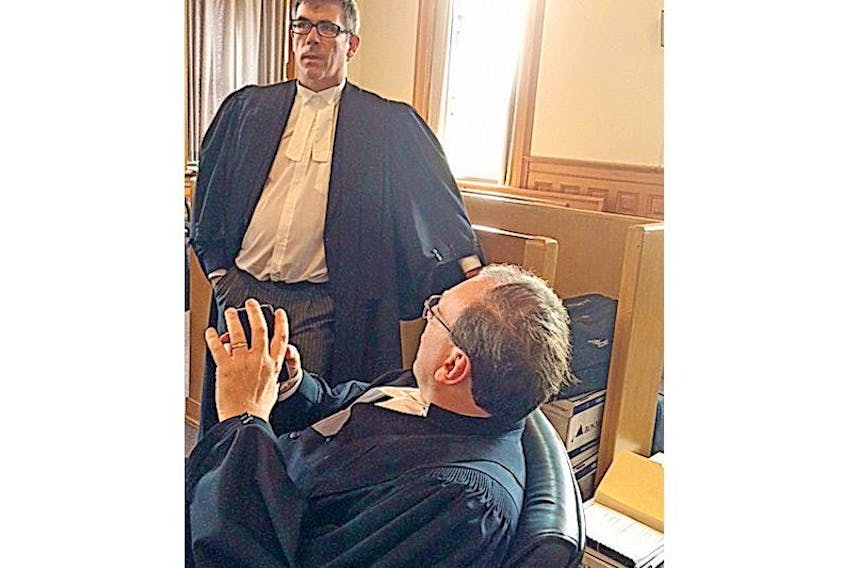
Mount Cashel abuse claimants’ lawyer Geoff Budden (left) speaks with Toronto lawyer Mark Frederick, who represents the Roman Catholic Episcopal Corp. of St. John’s. They were at the first day of the start of the Mount Cashel civil trial in the Supreme Court of Newfoundland and Labrador.
In the morning, the leads on two teams of lawyers outlined opposing arguments of whether the Roman Catholic Episcopal Corp. of St. John’s is liable for physical and sexual abuse of boys by members of the lay order Christian Brothers at the infamous orphanage from the 1940s to the 1960s.
And in late morning and all afternoon, the first of four men to lay bare at this civil trial their life stories, got to the unsettling descriptions of a childhood forever marked by his experiences with the Christian Brothers and a couple employees at the orphanage.
The man cannot be named because of a publication ban in the John Doe case.
He told of grubs in daily rations of porridge, rat and mice droppings in bread and starved boys so desperate that they looked for scraps in a vat of swill collected from the leftovers of patients at city hospitals. That swill was meant for the pigs on the orphanage farm, but the boys would look for bits of meat and anything else edible.
But the man described life — before he and his four brothers came to the orphanage with one suitcase between them in 1948 — as far different. He said it was happy, until his mother died of cancer at age 31. The man testified he was just seven then, and recounted how he and his brothers kissed their mother goodnight each evening while she laid in her coffin, being waked at home.
His distraught father, although not abusive to the boys, stayed out after work a lot and drank after his wife’s death. The boys became unkempt, and a welfare man in their community near St. John’s arranged for them to be placed in the orphanage, the witness recalled. The community priest told the then seven-year-old he would like Mount Cashel because there were horses there.
He told the court that when he and his siblings arrived at the facility, his brother slipped on the wax floor and he thought to himself that was a “bad omen.”
Archbishop Martin Currie, who plans to attend the whole trial, and other church officials listened as the witness testified, describing to the court incidents in which he was sexually and physically abused by some of the Brothers and a couple of employees.
The witness did describe some kindly Brothers. But others gave brutal beatings, he said, describing how one was nick-named “Killer.”
One Brother he described “habitually” sexually abused him, and he said that man was convicted after a criminal complaint in the 1990s. Incidents of fondling, kissing, masturbating and other forms of sexual abuse by some other Brothers and staff were not as frequent.
He described one incident when he went to get a piece of bread from an orphanage worker when he was seven.
The man said when one of his brothers announced he was joining the Navy, he learned the boy wanted to get out because he was molested, but none of the orphanage boys ever discussed it among themselves and he did not know what his siblings went through at the time. He also said he would not tell his staunch Catholic family because he would not be believed.
“Who were you going to tell? Who? Another (Christian) Brother?” the man asked.
“Who were you going to tell? Would they believe you? See what happened in Ireland? What happened in Australia? What happened in the States? Nobody told anybody.”
The witness also described how his life at the orphanage came to a boiling point at Christmas in 1955.
That Christmas Day he was asked to pass out candy, but then was told by a Brother not to give any to certain boys. The kids — those not prohibited by demerit points — that night watched a movie, “Gunfight at the OK Corral.”
He said he heard a commotion and saw one of the Brothers had his best friend by the throat and was “beating the bejesus” out of the boy. The man said he defended his friend by hitting the Brother with a chair and called him a coward. He said he went to bed that night with a pitchfork tine, fearing there would be reprisals, but nothing happened.
But the next day the two of them were ordered out of the orphanage at age 15. Other boys gave them what coins they had. Eventually he went back to school after working odd jobs and earned a master’s degree in education and has retired from a teaching career.
When the Hughes Inquiry was being held in the late 1980s, the man said, he was home sick one day and turned on the TV. The inquiry was the result of a scandal related to the cases of later residents at the orphanage, in the 1970s and 1980s.
“I emotionally collapsed,” the man said, recounting how he first told his wife and son about what he experienced.
At the school where he taught, a Christian Brother gathered teachers in the library and asked them to pray for the Brothers getting a bad rap at the inquiry.
The man said he blew up at that and said the boys needed to be prayed for instead and told the group he had been abused, and also recounted how the other teachers supported him.
In opening statements, the claimants’ lawyer, Geoff Budden, said the church owes a duty to the boys who were abused there.
There are four test cases, representing about 60 claimants who are clients of Budden’s firm. (Roughly 20 other cases could be affected by the outcome of the trial.)
Budden said church officials were the lead when it came to dealing with the government and fund-raised money to contribute to the facility.
But Toronto lawyer Mark Frederick said the Christian Brothers were the wardens of the boys, and his client, the Roman Catholic Church, isn’t liable because the Brothers were clearly not employees of the archdiocese.
The trial is expected to take all of this month, break for a while, and extend into June, Justice Alphonsus Faour said.









